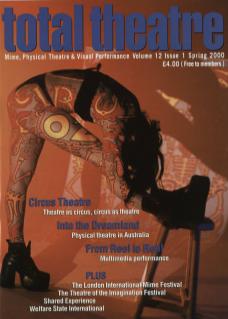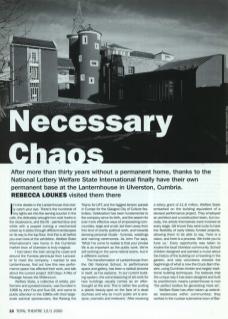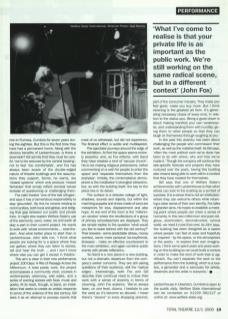It's the details in the Lantemhouse that really catch your eye. There's the hundreds of tiny lights set into the serving counter in the cafe, the delicately-wrought iron coat hooks in the cloakrooms, and the lift – painted blue and white with a puppet turning a mechanical wheel as it slides through different landscapes on its way to the top floor. And this is all before you even look at the exhibition. Welfare State International's new home in the Cumbrian market town of Ulverston is truly magical.
I had taken the train along the coast and around the Furness peninsula from Lancaster to meet the company. I wanted to see Lanternhouse, find out how this new performance space has affected their work, and talk about the current project 100 Days: A Rite of Passage Across the Millennium.
Welfare State, a collective of artists, performers and pyrotechnicians, was founded in 1968 by John Fox and Sue Gill, and came to public attention in the 1980s with their large-scale satirical spectaculars, like Raising the Titanic for LIFT, and the biggest lantern parade in Europe for the Glasgow City of Culture festivities. Celebration has been fundamental to the company since its birth, and the search for ever more effective ways of empowering communities, large and small, led them away from this kind of overtly political work, and towards devising personal rituals – funerals, weddings and naming ceremonies. As John Fox says, ‘What I've come to realise is that your private life is as important as the public work. We're still working on the same radical scene, but in a different context.’
The transformation of Lanternhouse from the Old National School, to performance space and gallery, has been a radical process in itself, as Fox explains. 'In our current building-system, the commissioning of art work for new buildings usually comes as an afterthought at the end. This is rather like putting a plastic beauty-spot on the face of a dead duchess and why so much public art is anodyne, cosmetic and irrelevant.’ After receiving a lottery grant of £1.6 million, Welfare State embarked on the building equivalent of a devised performance project. They employed an architect and a construction team, but crucially, the artists themselves were involved at every stage. Gill knows they were lucky to have the flexibility of early lottery funded projects, allowing them to be able to say, there is a vision, and here is a process. We invite you to fund us. Every opportunity was taken to involve the local Ulverston community. School children designed and painted a mural about the history of the building on a hoarding in the garden, and sixty volunteers erected the beginnings of what is now the Cruck Bar theatre, using Cumbrian timber and largely traditional building techniques. Fox believes that the unique way it has been designed and built by practitioners means Lanterhouse is now ‘the perfect toolbox for generating more art’.
“What I've come to realise is that your private life is as important as the public work. We're still working on the same radical scene, but in a different context.” – John Fox
Welfare State has often taken up extended residencies within communities; they worked in the nuclear submarine town of Barrow-in-Furness, Cumbria for seven years during the eighties. But this is the first time they have had a permanent home. Along with the obvious benefits of Lanternhouse, is there a downside? Gill admits that they must be careful ‘not to be seduced by the central heating', not to feel ‘too comfortable', and Fox has always been aware of the double-edged nature of theatre buildings and the assumptions they support. Some, he warns, are 'closed systems' which only produce 'closed fantasies' that simply reflect societal values instead of questioning or challenging them.
Fox calls theatre one of the ‘last refuges', and says it has a tremendous responsibility to stay 'grounded'. By this he means relating to communities, both local and global, and bridging that gap between our public and private lives. It might also explain Welfare State's use of the elements – sand, water, ice and earth all play a part in their current project. He wants to work with 'whole environments... total theatre'. And what better place to start than in Lanternhouse. John tells me, ‘I think what people are looking for is a space where they can gather, where they can listen to stories, tell and hear the truth ... and I don't know where else you can get it except in theatre.’
This aim is clear in their new performance project 100 Days: A Rite of Passage Across the Millennium. A total poetic work, the project encompasses a community choir, courses in contemporary ceremony, wild walks, and a series of evening soirées with food, music and poetry. At its heart, though, is Sand, an installation that seeks to create an artistic response to some of the violence of the last century. Gill sees it as an attempt to process events that most of us witnessed, but did not experience. The finished effect is subtle and multi-layered.
The spectator journeys around the edge of the exhibition. At first the space seems entirely peaceful, and, as Fox reflects, with Sand they have created a kind of 'secular church'. He is not making religious pretensions, rather commenting on a wish for people to enter the space and 'separate themselves from the everyday’. Initially, the contemplative atmosphere is the installation's strongest attraction, but, as with the building itself, the key to the piece lies in its detail.
The surface is a delicate collage of light, shadows, sounds and objects, but within the marching puppets and shoes made of sand are metaphors for loss, displacement and also hope. At one end of the room is the 'millennium window’ where the recollections of a group of primary school teachers are displayed. They are simple replies to the question 'what would you like to leave behind with the old century?' Their answers – some predictable (stress, money worries), some more personal (ex-boyfriends, illnesses) – make an effective counterpoint to the main exhibition, and again combine public events with private reflections.
So Sand is a new piece in a new building, but not a dramatic departure from the company's earlier concerns. They are still asking questions of their audience, still the 'radical edges'. Interestingly, both Fox and Gill describe their continual need to imbue their work with a sense of anarchy in terms of clowning. John Fox explains, 'We've always been, on one level, clowns. I hesitate to use the word as it's become so abused. I mean there's "clowns" in every shopping precinct, part of the consumer industry. They make you feel good, make you buy more. But I think clowning is the greatest art form. It's generating necessary chaos of every kind, in relation to the status quo. Being a good clown is about making manifest your own weaknesses, and understanding them with humility; giving them to other people so that they can laugh at themselves through laughing at you.'
In the past this anarchy has been about challenging the people who commission their work, as well as the material itself. As Gill says, ‘often the most political work we've done has been to do with where, why and how we've made it’. Though the company will continue the site-specific festivals and projects they have nurtured over the years, having this building also means being able to work within a context that they have created for themselves.
Gill says that one of Welfare State's achievements with Lanternhouse is that other artists can look to the building as a symbol of success. It is a venue that is not an institution, where they can welcome others while retaining a clear sense of their own identity. Fox talks of grander aims. He hopes to establish a meeting point where people can share a sense of humanity. In this new millennium and post-religious, postmodern, deconstructed, cynical world, we need it more than ever. As John says, the building has been designed as a space where people ‘can feel at ease and hopefully be inspired by the space, or the atmosphere or the poetry to explore their own imaginations. I think we’ve spent years and years working on this building so we could build a context in order to make the kind of work that is significant. You can't separate the work or the performance from the building, which is a toolbox, a generator and a sanctuary for artists, dreamers and the artist in everyone.’
Lanterhouse in Ulverston, Cumbria is open to the public daily. Welfare State International can be contacted online at: www.welfare-state.org.


